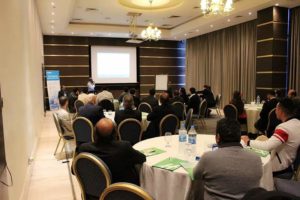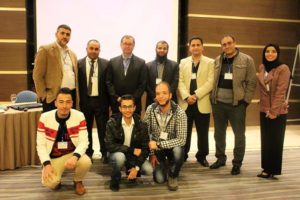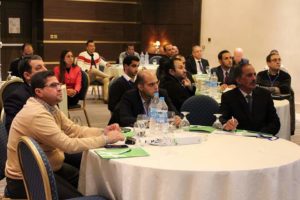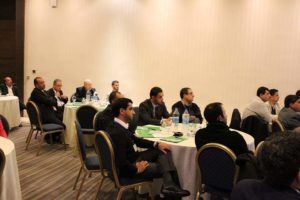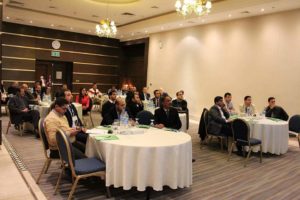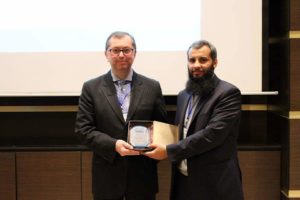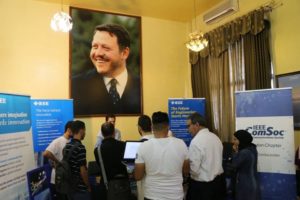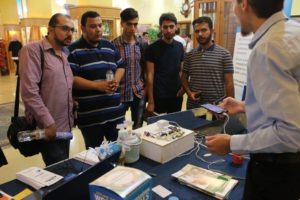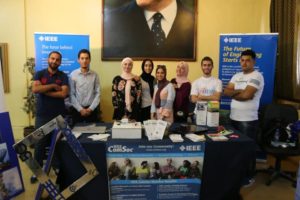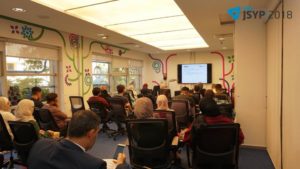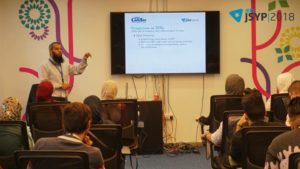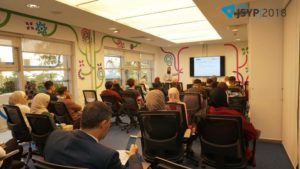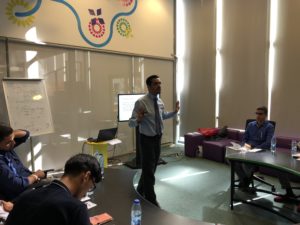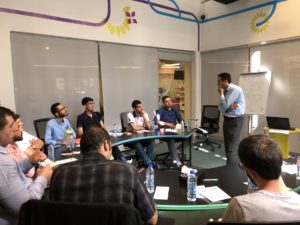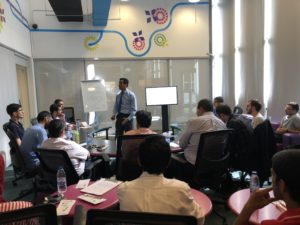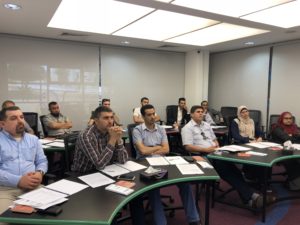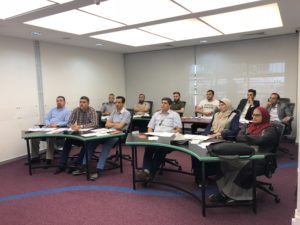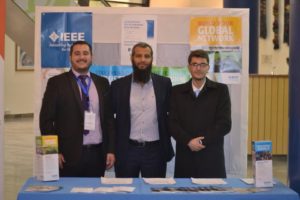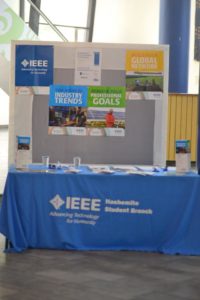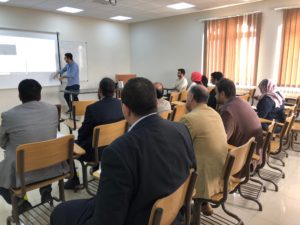First Annual IEEE JCSC 2018
The event’s program includes a valuable lecture by our guest IEEE ComSoc Distinguished Lecturer Prof. Halim Yanikomeroglu from Carleton University, Ottawa, Canada. The lecture is visionary in its nature and addresses the cutting edge topic of 6G networks. It is titled
“6G NETWORKS FOR UBIQUITOUS 3D SUPER-CONNECTIVITY”
The second main event will be Insha’Allah a panel discussion hosting Prof. Yanikomeroglu and Dr. Raed Mesleh from the German Jordan University that will be themed
“Conducting Quality Research and On the Art and Science of Publishing in Scholarly Periodicals”
Finally, you are invited amongst all our guest to the open buffet dinner at the hotel. In the end, we hope that you attend our event and be an active member of our vibrant IEEE Jordan ComSoc.
Booth at the IEEE Day in the Balqa’a Applied University
Date: 15 Oct 2018
We had a booth at the IEEE Day in BAU to promote our membership. This resulted in the establishing of the IEEE BAU student chapter.
Software Defined Radios:
Road to 5G Seminar Sept 2018
Date: 15 Sep 2018
Abstract:
This workshop was organized as an event in the IEEE Jordan Student and Young Professional Congress (JSYP) 2018.
This workshop introduces the intriguing field of software defined radios (SDRs). SDR has been around for more than twenty years hidden in our phones, laptops and tablets powering our smart digital lives. You will get to know how SDRs are paving the way for research and innovation for the 5G revolution, by providing an efficient hardware-in-a-loop paradigm that accelerate the research span and shortens the time –to-market. Moreover, we will go over how SDRs became integrated in several education programs. Finally, you will witness the SDR in action by trying out several live examples using MATLAB and RTL-SDR.
Outline:
- 20 Years of Software Defined Radios (SDR).
- SDR Innovation in 5G Research.
- SDR Revolution in Education.
- SDR Real-time Examples using MATLAB and RTL-SDR.
Speaker:
 Sami Ahmed Aldalahmeh received his PhD degree from University of Leeds, UK, in 2013, in which he obtained funding from Leeds University and the US Army Research Lab. He was awarded his MSc degree in Communications Signal Processing from King’s College London, UK, in 2007 with distinction and top of his class. He earned his BSc degree in Electrical Engineering from the University of Jordan, Jordan, in 2006. Currently he is an associate professor in the Engineering and Technology Faculty at Al-Zaytoonah University of Jordan since 2013. His research interests include distributed detection and estimation, wireless sensor networks, stochastic geometry models for wireless networks, delay and throughput in wireless sensor networks, and sensor signal processing. Dr. Aldalahmeh currently is the chair of the IEEE Joint Communication and Signal Processing Society chapter in the Jordan section. He also served as its secretary before. He is a senior IEEE member and an active IEEE member for 15 years with affiliation is the IEEE signal processing and communication societies. He has established the first IEEE signal processing chapter in Jordan as a joint chapter, in addition to helping in establishing several IEEE communication and signal processing student chapters.
Sami Ahmed Aldalahmeh received his PhD degree from University of Leeds, UK, in 2013, in which he obtained funding from Leeds University and the US Army Research Lab. He was awarded his MSc degree in Communications Signal Processing from King’s College London, UK, in 2007 with distinction and top of his class. He earned his BSc degree in Electrical Engineering from the University of Jordan, Jordan, in 2006. Currently he is an associate professor in the Engineering and Technology Faculty at Al-Zaytoonah University of Jordan since 2013. His research interests include distributed detection and estimation, wireless sensor networks, stochastic geometry models for wireless networks, delay and throughput in wireless sensor networks, and sensor signal processing. Dr. Aldalahmeh currently is the chair of the IEEE Joint Communication and Signal Processing Society chapter in the Jordan section. He also served as its secretary before. He is a senior IEEE member and an active IEEE member for 15 years with affiliation is the IEEE signal processing and communication societies. He has established the first IEEE signal processing chapter in Jordan as a joint chapter, in addition to helping in establishing several IEEE communication and signal processing student chapters.
Spectrum Sensing in Cognitive Radio
Location: Hussain Business Park
Date: 4 Aug 2018
Abstract:
Cognitive radio (CR) is considered as an intelligent technology and an important part of the next fifth generation wireless systems. It promises a great utilization of the radio spectrum, and it enables more subscribers to access the network and exchange data. CR is a communication system that has the ability to make self-decisions in order to connect its subscribers (secondary users (SUs)) to the network whenever there is a particular section of the spectrum that is unoccupied by primary users (PUs) to use it for data exchange. In addition, it has to be capable of predicting whenever a PU is going to utilize the spectrum band (spectrum sensing), which means the SU should leave the band, for the purpose of not disturbing the PU. Alternatively, the CR must maintain a good quality of service (QoS) level for its users by finding other opportunities for them to continue their activities. The SUs of the cognitive radio are named as such because they, unlike the PUs, do not have the right for spectrum band access at any given time, since the PU paid for the right of accessing the band at any given time in the first place. Therefore, the SU gains access to the band if the PU is not occupying it, or when the PU itself allows the SU to share the band, given that the SU will not disturb the activity of the PU in any sort of way. Spectrum sensing is almost a continuous process during the life cycle of cognitive radio communications. Sensing must be done initially to find an idle channel, and then it must be done periodically to protect the PU when he decides to use his licensed channel again. In this case, sensing is invoked again to find a different idle channel. Therefore, reducing sensing time increases the room left for transmission and consequently achieves the main goal of CR in increasing the utilization of the wireless spectrum. In fact, sensing does not only allow CR nodes to use the idle licensed channels, but also plays an important role in protecting the PU from interference. Thus, sensing has received a lot of attention in CR in the research community. Technically, the sensing process implies detecting the existence of a primary transmitter on a specific channel. The CR nodes are allowed to use the PU’s channels if they can identify the channel as idle. Otherwise, the CR nodes back off to allow the PU to use its channel with no interference.
Speaker:
 Ghazi AL SUKKAR received his Ph.D degree in Electrical and Computer Engineering/Wireless communication networks from Telecom Sudparis previously known as Institut National des Telecommunications, Paris, France in 2008. He received his M.Sc. degree in Telecommunications engineering from The University of Jordan, Amman, Jordan, in 2003 and the B.Sc degree in electrical engineering/Telecommunications from Jordan University of Science and Technology, Irbid, Jordan, in 2000. He joined the Department of Electrical Engineering at the University of Jordan in 2009. His current research focuses on various aspects of wireless communication networks including Wireless sensors, Mesh, Vehicular and P2P networks, Cognitive Radio Networks, LTE-Advanced, with emphasis on system architecture and communication protocol design. Other interests include digital signal processing, and traffic simulation.
Ghazi AL SUKKAR received his Ph.D degree in Electrical and Computer Engineering/Wireless communication networks from Telecom Sudparis previously known as Institut National des Telecommunications, Paris, France in 2008. He received his M.Sc. degree in Telecommunications engineering from The University of Jordan, Amman, Jordan, in 2003 and the B.Sc degree in electrical engineering/Telecommunications from Jordan University of Science and Technology, Irbid, Jordan, in 2000. He joined the Department of Electrical Engineering at the University of Jordan in 2009. His current research focuses on various aspects of wireless communication networks including Wireless sensors, Mesh, Vehicular and P2P networks, Cognitive Radio Networks, LTE-Advanced, with emphasis on system architecture and communication protocol design. Other interests include digital signal processing, and traffic simulation.
Wireless for IoT Workshop
Date: 14 July 2018
Abstract:
The ComSoc provided this IEEE ComSoc certified offline training on the wireless aspect of the internet-of-things (IoT). We had 13 participants, 5 of which were non-members that joined us after the workshop. The participants received an official IEEE certificate of their attendance.
Booth at Grand Tech 2018
Date: 28 April 2018
The ComSoc had a booth in one of the largest student activities in the Kingdom. We were able to promote our membership by distributing flyers and brochure about the IEEE ComSoc.
INTRODUCTION TO WIRELESS COMMUNICATIONS USING SOFTWARE DEFINED RADIOS
Location: Al-Zaytoonah University of Jordan
Date: 25 April 2018
Abstract:
This seminar topics include: We will physically setup and plug in a USRP, write a program in LabVIEW, and then visualize the results.
- Wireless Signal Acquisition.
- Physically setup and plug in NI-USRP SDR.
- Program in LabVIEW.
- Visualize the wireless signal.
Speaker:
Eng. Mounzer Saleh
Academic Field Engineer at National Instruments


